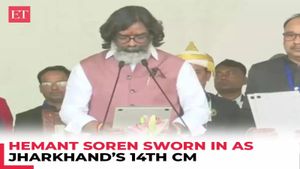Former Vice President Mike Pence's backlash against President-elect Donald Trump's latest cabinet selections has set the political stage ablaze, with notable resistance mounting particularly against the nomination of Robert F. Kennedy Jr. for the position of Secretary of Health and Human Services. This nomination, Pence argues, strays from the pro-life principles championed during their administration, raising alarms among many within the conservative base.
On Friday, through his organization Advancing American Freedom, Pence called for Senate Republicans to reject Kennedy’s nomination due to his long-standing support of abortion rights. "I believe the nomination of RFK Jr. to serve as Secretary of HHS is an abrupt departure from the pro-life record of our administration and should be deeply concerning to millions of pro-life Americans who have supported the Republican Party and our nominees for decades," Pence asserted.
Trump's choice to tap Kennedy—who has faced scrutiny for his controversial views on vaccines—could raise challenges during the Senate confirmation proceedings, which will require at least 51 votes for any nominee to pass. Pence’s denunciation of the nomination also hints at the deepening divide between him and Trump since the tumultuous events surrounding the January 6 Capitol riots.
There's no denying Trump’s cabinet selections have drawn significant attention and criticism. He has also nominated former Florida Congressman Matt Gaetz as his pick for Attorney General, raising eyebrows due to Gaetz's past ethical concerns and lack of substantial legal experience.
Pence, who previously exhibited support for Trump’s post-election decisions, expressed frustrations during the month following the GOP presidential primary contests, aligning himself with the pro-life faction of the party. After Trump, who returned to the White House following the recent elections, indicated ambitions for sweeping cabinet picks, Pence’s claims reveal both ideological clashes and competing visions for the party’s future.
During remarks at the Conservative Political Action Conference last week, Pence offered praise for several of Trump’s initial nominations, yet quickly backtracked with his latest remarks. It’s clear his commitment to traditional conservative values, especially the pro-life agenda, takes precedence over party loyalty, especially as he previously remarked he could not endorse Trump’s run again. With Kennedy’s nomination, Pence doesn’t appear to be willing to sacrifice his principles for allegiance to Trump at this juncture.
Meanwhile, grassroots organizations and advocacy groups are mobilizing against Trump's nominee selections. An online petition spearheaded by the progressive group MoveOn aims to provoke swift Senate action to block Trump's Cabinet picks. With over 44,000 signatures amassed shortly after its launch, the petition cites both Kennedy and Gaetz as controversial figures whose nominations the Senate should resist. "The Senate must reject these Cabinet nominees to protect working Americans from the dysfunction our federal agencies will face under the direction of these appointees," the petition reads.
Hegseth’s selection also raises eyebrows, especially considering his background as both a Fox News host and author of several books espousing beliefs heavily tinged with far-right ideologies. His writings, particularly American Crusade, portray Islam as fundamentally antagonistic toward the West, invoking crusader sentiments and embracing conspiracy theories about demographic shifts and cultural changes resulting from immigration.
Experts are alarmed at the policies Hegseth could promote from the position of Defense Secretary, as his views have been criticized for fostering division and targeting marginalized communities. Similar sentiments arise around potential cabinet confirmations; many believe the Trump administration might progress toward implementing the contentious Project 2025 agenda, which outlines extensive regulatory rollbacks across various federal agencies.
Scholars challenge the narratives Hegseth adopts within his books, pointing to historical inaccuracies and biased interpretations of both Islam and global migration patterns. The growing backlash against Hegseth's rhetoric highlights concerns about his influence at the Pentagon. Should these ambitious cabinet nominees undergo confirmation, many Americans fear the ramifications for domestic and foreign policy.
Under this backdrop, Trump’s prominent selections are also viewed with skepticism based on their willingness to cater to radical elements within the GOP. Gaetz has faced scrutiny over past generations, from ethics investigations to accusations of moral failings involving minors, which raises questions about his leadership capabilities as Attorney General. While Gaetz has vehemently denied any wrongdoing, many critics highlight the potential harm of his presidency—a stark reminder of the complicated history between him and both the Republican party and Trump.
This political circus surrounding Trump’s second cabinet draws comparisons to contentious past confirmations, where both the presidential and Senate dynamics play significant roles. Experts affirm it could be challenging for any nominee to receive bipartisan support, particularly from senators representing conservative constituencies vehemently against Trump’s nominations.
Trump’s cabinet picks could signify more than just personnel changes—they represent ideological shifts, ambitions to reframe party principles, and test the mettle of the GOP's ability to navigate differing factions within its ranks. Meanwhile, the tension between Trump and Pence points toward larger questions surrounding leadership, loyalty, and the future direction of the Republican party.
For now, as the Senate gears up for the confirmation hearings, the political arena waits with bated breath, bracing for debates anticipated to fuel partisan fires and possibly reshape the GOP as they prepare to re-enter the national political conversation.
This moment gives citizens the opportunity to witness how political maneuvering, ideological fidelity, and the pressure of public sentiment intersect during consequential political decisions. With Pence’s voice ringing out against Trump’s cabinet selections and substantial movements brewing among grassroots organizations, it’s clear this political environment brims with tension, and every appointment carries significant weight leading up to the Senate debates.
One thing is crystal clear: the path forward for Trump’s cabinet and Pence's stance will culminate in shaping the Republican narrative well beyond mere electoral terms. Whether these dynamics will bear fruit or lead to fracturing remains to be seen as the political winds shift and the dissent grows louder.



